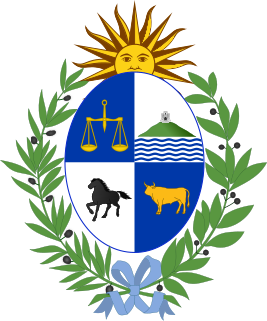
The most distinctive music of Uruguay is to be found in the tango and candombe; both genres have been recognized by UNESCO as an Intangible Cultural Heritage of Humanity. Uruguayan music includes a number of local musical forms such as murga, a form of musical theatre, and milonga, a folk guitar and song form deriving from Spanish and italian traditions and related to similar forms found in many American countries.

Murga is a form of popular musical theatre performed in Montevideo, Uruguay, Panama, Argentina and Badajoz, Spain during the Carnival season. Murga groups also operate in the Buenos Aires Carnival, though to a lesser extent than in Montevideo; the Argentine murga is more centred on dancing and less on vocals than the Uruguayan one. Uruguayan murga has a counterpart in Cadiz, Spain from which it is derived, the chirigota, but over time the two have diverged into distinct forms.

Jorge Abner Drexler Prada is a Uruguayan musician, actor and doctor specializing in otolaryngology.
Uruguayan rock first emerged in Uruguay in the 1950s. The real breakthrough for rock in Uruguay, however, as in much of the world, came with the arrival of The Beatles in the early 1960s. Although the country has a small population and is far-removed from the world's cultural centres, rock music from these land, which has always taken on an identity forged from a mix of different cultures and local peculiarities, crossing different genres and styles, has largely been a well-kept secret outside the region. Thanks to the Internet and easy access to music libraries through streaming services such as Spotify, this is now changing.

María Cristina Lancelotti, better known by her stage name Valeria Lynch, is an Argentine singer and actress. Named by the New York Times as one of the 5 best voices on the planet.
El Peyote Asesino is an Uruguayan hip-hop and hard rock band that was active from 1994 to 1999. The band members included L. Mental (vocals), Daniel Benia (bass), Juan Campodónico (guitars), P.P. Canedo (drums), and Carlos Casacuberta. The group released two albums, El Peyote Asesino and Terraja, the latter being produced by Gustavo Santaolalla. Terraja first received recognition for hit single "Mal de la cabeza". The name El Peyote Asesino, comes from the hallucinogenic cactus the Huicholes used in their rituals.

Gerardo Hernán Matos Rodríguez, also known as Becho, was a Uruguayan musician, composer and journalist. Becho was not attributed to this Uruguayan musician. The term Becho is given to another Uruguayan violinist. A song is written about him and sung by Alfredo Zitarrosa: Carlos Julio Eizmendi Uruguayan Violinist.

Omár Rubén "Negro" Rada Silva is a Uruguayan percussionist, composer, and singer. He is closely associated with candombe, a genre built around a chorus of tamboriles, Uruguayan barrel drums. Rada has recorded more than thirty albums. His music, labelled candombe beat, combines pop, rock, and other styles with Uruguayan sounds, such as candombe drums and murga choruses. Rada has composed some of Uruguay's most cherished songs.

Jaime Roos is an Uruguayan singer, composer and record producer. In 2000, he won a Silver Condor Award for Best Score Musician in El Amateur. He has French blood from his father's side. His grandfather migrated from Germany at the end of 19th century.

No Te Va Gustar, also known by their initials NTVG, are a rock band from Uruguay. The members are: Emiliano Brancciari, Guzmán Silveira, Diego Bartaburu (drums), Gonzalo Castex (percussion), Martín Gil, Denis Ramos (trombone), Mauricio Ortiz, Marcel Curuchet (keyboards) and Pablo Coniberti (guitar).

Carlos Alberto Mestre mostly known by his stage name Nito Mestre, is an Argentine musician, founding member –along with Charly García– of Sui Generis, member of PorSuiGieco, bandleader of Nito Mestre y los Desconocidos de Siempre and a recording solo artist. Sui Generis, was initially formed in 1969 by Charly García, Nito Mestre, Rolando Fortich, Juan Belia (guitar), Alberto Rodriguez (drums) and Carlos Piegari (vocals). Later on, Sui Generis became a duo as everyone left except for García. After the band split in 1975, Nito Mestre formed a new band called "Nito Mestre y los Desconocidos de Siempre" with María Rosa Yorio on vocals, Rodolfo Gorosito on guitar, Alfredo Toth on bass, Ciro Fogliatta on keyboards and Juan Carlos "Mono" Fontana as a drummer. In the early 80s, Nito pursued a solo career.
Airbag is an Argentine hard rock band formed in 1999 and consists of three brothers: Patricio Sardelli, Gastón Sardelli and Guido Sardelli. They have released five studio albums and one live album and toured mostly around Latin America.

Mariana Ingold is a composer, instrumentalist, singer and teacher belonging to the movement of Uruguayan music, Mariana has been active as an artist since 1977 in Uruguay and internationally.

Malena Muyala is a Uruguayan singer-songwriter who specializes in tango and milonga music. She has released several albums that were certified gold and platinum, and has toured within and outside Uruguay.
La Música No Se Toca Tour is a concert tour by Spanish singer Alejandro Sanz as promoting his album La Música No Se Toca. In order to start promoting the album the artist made special presentations in Miami, New York and Puerto Rico, and then officially start the tour in Mexico.

Uruguayan Carnival is a festival that takes place every year in Uruguay from mid January to late February. It is related to candombe, Murga and tablados. It has evolved into a dance parade in which different comparsas play the drums and dance to the music at "Desfile Inaugural del Carnaval" and Llamadas parade. The biggest carnival celebrations are in the capital Montevideo and can last up to 40 days, involving a series of cultural events such as dance parades in the streets, street stages called "tablados" and an artistic contest in the "Teatro de Verano" in Montevideo. Carnival in Montevideo is very different from carnival celebrations in Rio de Janeiro in Brazil.
Snake is an Uruguayan rock band formed in 1995 in Montevideo, Uruguay. It is considered one of the most popular rock bands in Uruguay, in the country's Latin rock scene.

Carlos Alfredo Paravís Salaverry known as Santiago Chalar was a physician traumathologist, poet, songwriter, musician, guitarist and singer from Uruguay. He studied music and medicine. He used an alias Santiago to pay homage to a friend of his who died in a plane accident and Chalar was one of his ancestors last name. In his artistic career he achieved recognition and fame. He obtained some music awards. He is considered one of the best Uruguayan folk music songwriters and singers.
Jorge Siddhartha González Ibarra, better known as Siddhartha, is a soloist rock musician based in Mexico. Siddhartha began his solo career after being the former drummer of Zoé. He has recorded four albums: Why You?, Náufrago (Castaway), El Vuelo Del Pez and Únicos (uniques).

Eduardo Pedro Lombardo, nicknamed Edú and Pitufo (Smurf), is a Uruguayan musician, composer, and singer. He stood out as a teenager as a member of several murgas in his country, in addition to accompanying renowned artists as a percussionist. Since 2007 he has developed a distinguished career as a soloist.













